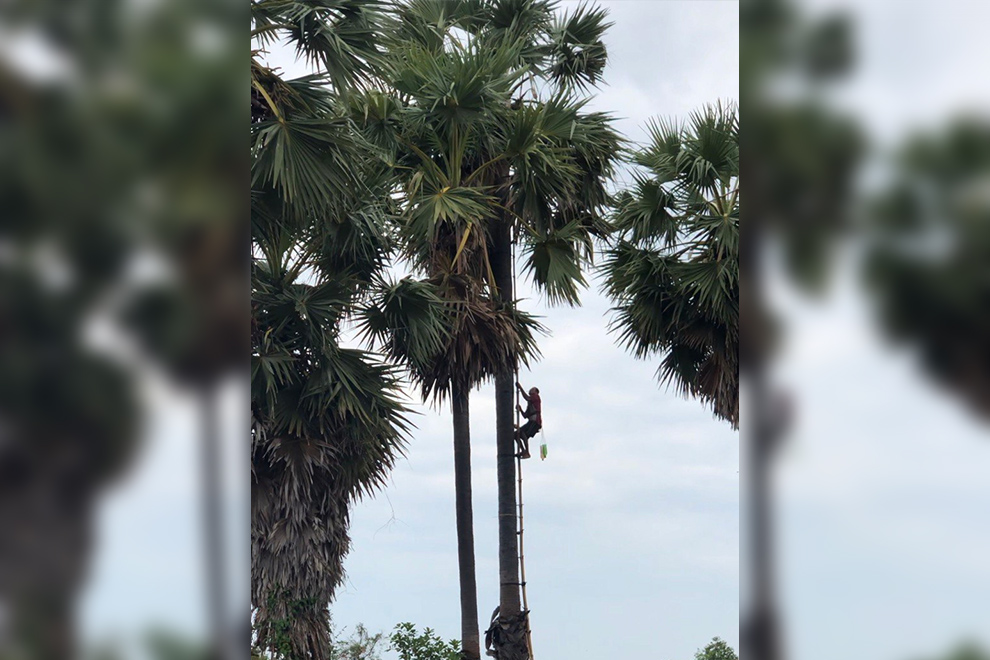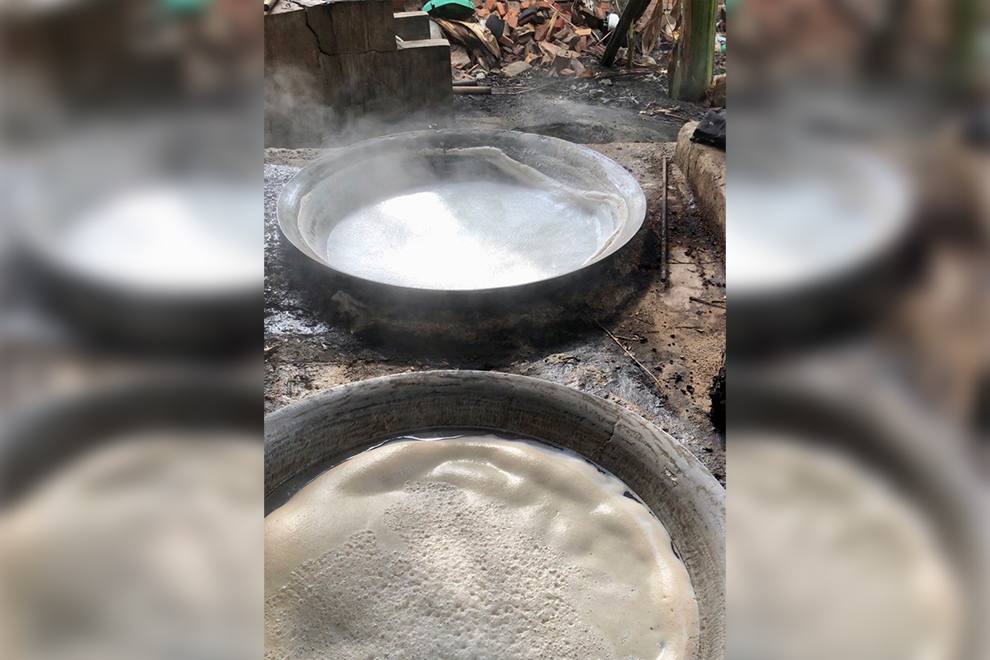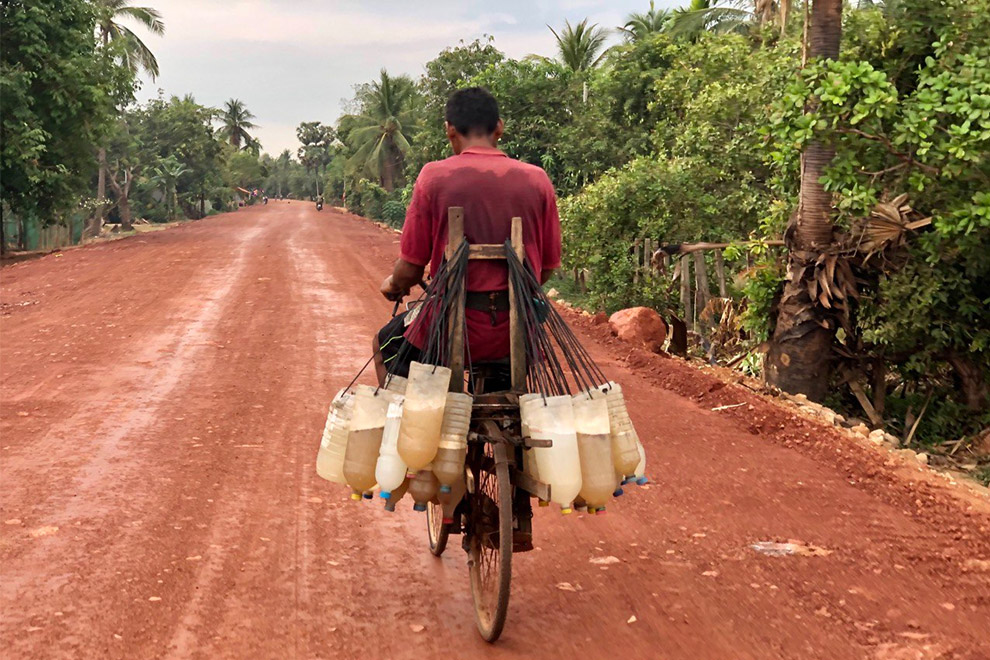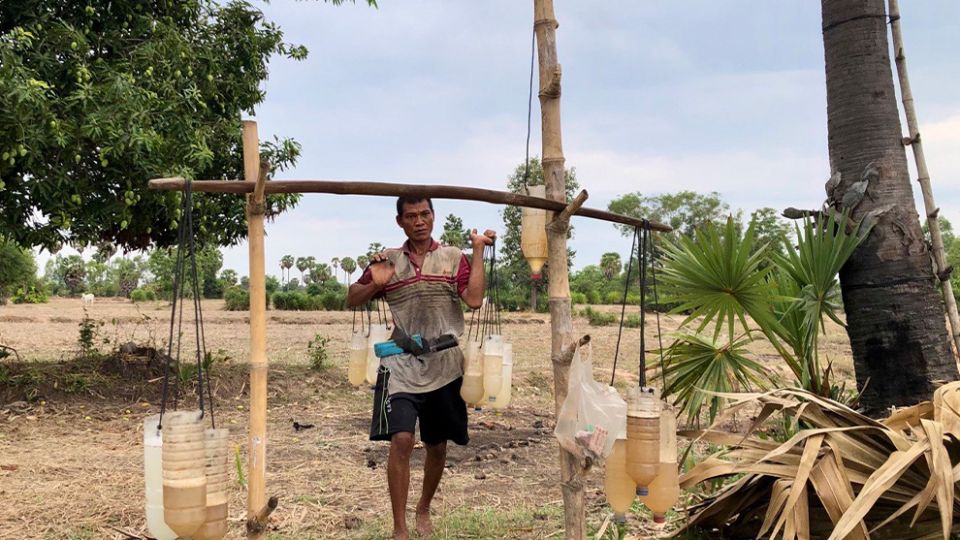April 24, 2025
PHNOM PENH – Before the sun peeks over the horizon in Siem Reap province’s Rumchek commune, in Banteay Srei district, Chhat Chhoeum is already high atop one of the palm trees that dot the land. It’s not yet 5am, and the farmer is on a mission, one he’s pursued for two decades: to harvest the sweet, golden juice that becomes pure, natural palm sugar.
With several containers slung from his belt, Chhoeum – who is in his early 50s – climbs around 30 trees each morning, his hands and feet moving with the rhythm of experience. By 3pm, he’s back for a second round, collecting fresh juice under the hot sun.
Down below, his wife, Sun Nan, tends to a crackling fire. The mother of four stirs a large pan, transforming the palm juice into rich, caramel-hued sugar. The couple’s work is a labour of love, a tradition that sustains their family. But it’s not without its challenges.
For 20 years, Chhoeum and Nan have poured their hearts into crafting palm sugar the old-fashioned way — no additives, no shortcuts. They are not the only remaining farmers who pursue this career, but age has caught up to most of their contemporaries.
“This is pure, from the tree to the pan,” Chhoeum says, wiping sweat from his brow. The process is gruelling, and there was a year when illness forced him to step away entirely, leaving the family to scrape by. Yet, they returned to their craft with resilience, driven by a belief in the value of their product.

The farmer – now in his early 50s – notes that most of his contemporaries can no longer make the climb. PHOTO: THE PHNOM PENH POST
Their sugar is a taste of Cambodia’s soul — earthy, sweet and untainted. It’s the kind of ingredient that elevates a dish or a cup of tea, carrying the story of the land and the hands that made it.
Neighbours trust its quality, often buying kilogrammes to send to relatives in Australia or the US, where pure palm sugar is a rare treasure.
“They know it’s real and trust us because they lived here,” Nan says, referring to the families in her village who have migrated to either Australia or the US.
But not everyone values their work the same way. Chhoeum’s face clouds when he speaks of a few wholesale buyers who purchase his sugar only to mix it with cheaper ingredients, mass-producing imitations for profit.
“I wonder why they get rich so fast; they could buy car in just a few years” he says, “while we work the same way, just to survive.”
The betrayal upsets him, but it hasn’t dimmed his optimism. He believes that discerning customers — those who care about authenticity and healthy food — will always seek out the real thing.
Pure palm sugar like Chhoeum and Nan’s isn’t just a sweetener; it’s a healthier alternative to refined sugars. It’s a natural choice for conscious eaters, from home cooks to chefs, who want to support sustainable, small-scale farmers. Every spoonful carries the weight of their dedication, a reminder that quality endures.

His wife Sun Nan keeps a fire going as she reduces the precious liquid down to its purest essence. PHOTO: THE PHNOM PENH POST
As the sun sets over Rumchek, Chhoeum only descends from his last tree of the day, his container brimming with juice. Nan stokes the fire, ready to boil the day’s harvest. They may not be rich, but they’re rich in resolve.
“Good sugar will always have its place. All my sugar will be sold out,” Chhoeum says, a smile breaking through.
Wholesalers who purchase large orders may get his first grade product for as little as 5,000 riel per kilogramme – depending on their negotiation skills, while smaller volume buyers generally pay closer to 6,000.
Once first grade sugar reaches the market, however, it can be sold for as much as 10,000 or 20,000 riel per kilogramme. The heavily diluted “second grade” sugar generally goes for around 5,000.
For those who choose pure palm sugar, it’s more than a purchase — it’s a vote for tradition, for honesty, and for the quiet heroes like Chhoeum and Nan, who climb and stir to keep Cambodia’s sweetest legacy alive.

Chhoeum’s ‘first grade’ palm sugar can cost as much as 20,000 riel per kilogramme once it reaches the market. PHOTO: THE PHNOM PENH POST

High above the ground, Chhoeum captures the precious liquid from his palm trees. PHOTO: THE PHNOM PENH POST


